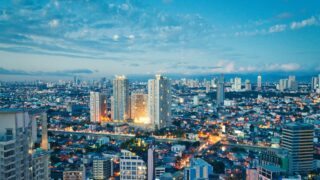Leading High Performing Remote Teams
How can leaders ensure that performance remains high in remote or hybrid-work environments?
Content Marketing
In this course, you’ll learn how compelling blogs, videos, podcasts, and other media can reach customers and drive sales. You’ll also learn steps for creating an effective content marketing plan, and some important ways to measure its impact and success.
Content marketing is a essential digital marketing strategy for companies looking to provide relevant and useful information to support your community and attract new customers.
Get started on your content marketing journey today.
Sustainable Innovation in Times of Disruption: Choices for a Better Society
There are opportunities for progress all around us. The key is to innovate on these opportunities sustainably.
To help identify most effective path forward, you'll need to gain a global perspective to these challenges in an open discussion. How can Japan and the world take action to create a more sustainable, innovative world? Where do you fit in?
It's time to find out.
Social Media & Digital Communications: Impact on Global Public Opinion
Social and digital media have dominated the communications industry for decades. But it's no secret that social media has the power to sway public opinion, and the way in which many companies use these platforms could be seen as manipulative.
What do companies need to be aware of when utilizing social and digital media? How can these mediums be used to better communicate strategically with the world?
Discover what top media and communications experts have to say.
CAGE Distance Framework
Want to expand overseas? The CAGE distance framework can help ensure you're constructing a solid global strategy in four areas: cultural, administrative, economic, and geographic. Learn how to leverage useful differences between countries, identify potential obstacles, and achieve global business success.
Servant Leadership
There's more to leadership than driving a team to profit. In fact, there's a word for looking beyond self-interest to prioritize individual growth: servant leadership. Try this course for a quick breakdown of what that is, how it works, and how it can lead to organizational success.
Strategy: Creating Value Inside Your Company
Have you ever wondered why certain companies are more successful than others? The answer is strategy: internal processes that control costs, allocate resources, and create value. This course from GLOBIS Unlimited can give you the tools you need for that strategic edge.
Strategy: Understanding the External Environment
To plan strategy on any level, you need to understand your company's external environment. In fact, your level of understanding can impact hiring, budgeting, marketing, or nearly any other part of the business world. Want to learn how to do all that? This course from GLOBIS Unlimited is the perfect first step!
Using Japanese Values to Thrive in Global Business
Japanese companies have unique cultural, communication, and operational challenges. But they also have values that have led to remarkable longevity. Check out this seminar to hear how these values help earn trust from overseas head offices and develop employees.
Marketing: Reaching Your Target
Every company works hard to get its products into the hands of customers. Are you doing everything you can to compete? In this course, you’ll find a winning formula to turn a product idea into real sales. Follow along through the fundamentals of the marketing mix and see how companies successfully bring products to market.
Basic Accounting: Financial Analysis
Want to compare your performance vs. a competitor? Or evaluate a potential vendor? Then you'll need to conduct a financial analysis. This course will teach you how to use three financial statements and evaluate financial performance in terms of profitability, efficiency, soundness, growth, and overall strength.
Career Anchors
What drives you to be good at your job?
Career anchors are based on your values, desires, motivations, and abilities. They are the immovable parts of your professional self-image that guide you throughout your career journey.
Try this short GLOBIS Unlimited course to identify which of the eight career anchors is yours!
Leadership with Passion through Kokorozashi
The key ingredient to success? Passion.
Finding your kokorozashi will unify your passions and skills to create positive change in society. This GLOBIS Unlimited course will help you develop the values and lifelong goals you need to become a strong, passion-driven leader.
The Philippines may be a developing country, but it’s surprisingly progressive when it comes to the LGBTQIA+ community. A 2013 survey comparing seven countries in Asia-Pacific declared the Philippines to be the most “gay-friendly” country in Asia. The country also made CNN’s list of top Asian tourist destinations for gay people and ranked tenth-most LGBTQ-friendly country in the world.
Tolerance, however, is not the same as acceptance.
A recent survey showed that, statistically, acceptance of homosexuality in the Philippines has not changed between 2013 and 2019. Approximately 73% of Filipinos, who are primarily Catholic, believe that society should accept homosexuality—yet around 65% also believe that homosexuality is immoral. While embedded in mainstream culture and the entertainment industry, being gay in the Philippines is still traditionally viewed as an illness, a phase, or even a personal failure. Stories of people being shunned or abandoned by their families as a result of coming out are all too common.
These contrasting public sentiments are what make the Lesbian, Gay, Bisexual, Transgendered, Queer, Intersex, Asexual (LGBTQIA+) movement such a dynamic and thriving one in the Philippines. Organizations like non-profit Rainbow Rights Philippines and LGBT umbrella network LAGABLAB are pushing for gender equality via anti-discrimination legislation. But the country’s Sexual Orientation and Gender Identity Expression (SOGIE) Equality Bill remains one of the longest-running bills awaiting approval since its inception two decades ago.
Change, however, is certainly on the horizon. The only way toward social inclusivity and diversity is forward. The Philippines has made great strides in promoting freedom of sexual identity and gender expression over the last few centuries—yes, centuries. The following iconic LGBTQIA+ personalities and groups are just a taste of that change.
Next Article
5 Female Business Leaders Shaping the Future of Philippine Industry
5 Young Leaders Solving Sustainable Development Issues in the Philippines
Social Activism at Work: When to Get Involved
TAPAR, ELOFRE, AND LAMPINO
Gender-bending babaylanes: mystics who defied the Spaniards
Cross-dressing and gender experimentation date back to pre-colonial times in the Philippines. Before the Spaniards arrived in the 1500s, native shamans known as babaylanesassumed positions of authority as spiritual leaders and healers in their communities. They handled matters of agriculture, literature, medicine, ritual practices, and science.
Though traditionally associated with females, there are plenty of historical accounts of male babaylaneswho wore female clothes, acted like women, and publicly engaged in homosexual relations. Their unconventional status as both genders carried a potent symbol of reunification—a number gained popularity forresisting Spanish rule.
Among famous male babaylanes who were killed for their patriotism were Tapar, Ponciano Elofre, and Gregorio Lampino.
Tapar led an early revolt against the Spaniards in 1663 and was condemned as a heretic for founding a modified version of Christianity. More than 200 years later, skirt-wearing Ponciano Elofre rallied 2,000 followers against the Spaniards under the name Dios Buhawi(Whirlwind God). Gregorio Lampino amassed around 15,000 followers to fight against Spain under a religious cult called Pulahan or Dios Dios,known for their striking red outfits.

UP BABAYLAN
First LGBTQIA+ student organization in the Philippines
UP Babaylan was founded in 1992 after a hate crime committed against a student at the University of the Philippines revealed a clear need to protect LGBTQIA+ rights.
Before it became the largest, longest-running, and most recognized LGBTQIA+ student support group in Asia, UP Babaylan struggled to find the minimum accreditation requirement: fifteen members willing to expose their sexuality publicly. The organization also faced financial difficulties and ridicule.
Nevertheless, UP Babaylan refused to compromise on its mission of upholding LGBT+ rights and gender-diverse inclusivity. In 1996, the group joined the Philippines’ first Metro Manila Pride March. Today, the organization has its own campus headquarters and chapters and is a key resource in LGBTQIA+ matters for panel discussions, television shows, radio programs, and publications.
GERALDINE ROMAN
First transgender politician elected in the Philippines
Despite the Philippines’ generally progressive attitude, there are no openly gay Filipino politicians. But in 2016, forty-nine-year-old Geraldine Roman made history as the first publicly transgender Filipino congresswoman advocating for LGBTQIA+ rights.
The scion of a political family, Roman has served as the Representative of the First District of Bataan since 2016—a position previously held by her mother. She was included in Time Magazine’s list of “13 Inspiring Women of 2016” and named one of the “100 Leading Global Thinkers” of 2016 by Foreign Policy magazine.
Apart from championing the SOGIE Equality Bill, Roman has also filed several bills on agricultural improvements, eco-tourism, education, health, and livelihood development. Among these are House Bill 6595, which seeks to legalize civil unions regardless of gender, and the Regional Investment and Infrastructure Council Act to create special economic zones in Luzon.
DANTON REMOTO
Founder of Ladlad, the Philippines’ (possibly the world’s) only LGBT political party
Multi-award-winning writer, educator, and media personality Danton Remoto brings many accolades to the Filipino Pride movement. A Fullbright Scholar and recipient of numerous international scholarships for literature and creative writing, Remoto was a full-time professor of English and Journalism at Ateneo de Manila University from 1986 to 2009. He also worked as a reporter and columnist for the Philippine Free Press, became a radio commentator, and starred in a music video depicting the life of a gay man mistreated by his father.
In 2003, Remoto founded Ladlad—the Philippines’ first political party for LGBT. The party has progressed slowly over the years due to its low popularity among the country’s more traditional Catholic voters. Twice, in 2006 and in 2010, the party was prevented from registering with the Commission on Elections on the grounds of low membership and immorality. While these grounds have since been overturned by the Supreme Court, Ladlad has not yet won a seat in congress.
Nevertheless, Remoto continues to play a significant part in the growing visibility of LGBTQIA+ in Philippine media, business, and other fields. His coming-of-age novel, Riverrun—a story about a homosexual young man growing up in a military dictatorship—broke ground as the first gay novel published in the Philippines in 2015. A global edition was released by Penguin Random House SEA in 2020.

METRO MANILA PRIDE
One of the biggest LGBTQIA+ events in the Philippines
On June 26, 1994, the Philippines made LGBTQIA+ history when more than thirty members of LGBTQIA+ groups gathered to hold the first Pride march in Asia-Pacific. Dubbed “Stonewall Manila” after a 1969 protest for global LGBT+ rights in Stonewall, New York, the landmark event sparked an annual gathering of the LGBTQIA+ community in Manila. In 2019, Metro Manila Pride was attended by a record-breaking 70,000 people.
A volunteer-based, non-partisan, and non-profit organization, Metro Manila Pride is committed to educating and empowering the Filipino LGBTQIA+ community by creating safe spaces where members feel affirmed and included. Apart from its annual Pride March, the group’s core programs run year-round and focus on human rights education and research, policy advocacy for non-discrimination and equality, and LGBTQIA+ arts, culture, and expression.
An Empowered, Inclusive Future for the Philippine LGBTQIA+ Community
The Updated Philippine Development Plan 2017–2022 (the first medium-term plan outlined by the Duterte administration) recognizes the need for a gender-sensitive paradigm in nation-building moving forward. Although government initiatives and programs in this regard mainly revolve around women’s rights (connected to poverty and domestic abuse), it seems that the LGBTQIA+ community is not far behind on the agenda.
During the campaign season of the 2022 Philippine elections, then-presidential candidates Marcos and Robredo both publicly expressed support for the LGBTQIA+ community at public gatherings and rallies. Advocacy group LGBT Pilipinas has openly declared its support for the Duterte administration and family since 2016, as well as now-president Bong Bong Marcos and his vice-running mate Sara Duterte.
While the Philippines has its fair share of social issues, the way it has responded to homosexuality and gender diversity, particularly as an Asian country with reserved traditions of its own, is comparatively remarkable. With its track record of groundbreaking LGBTQIA+ historical moments, the country arguably has strong potential to emerge as a global role model for gender and sexuality diversity and inclusion.






